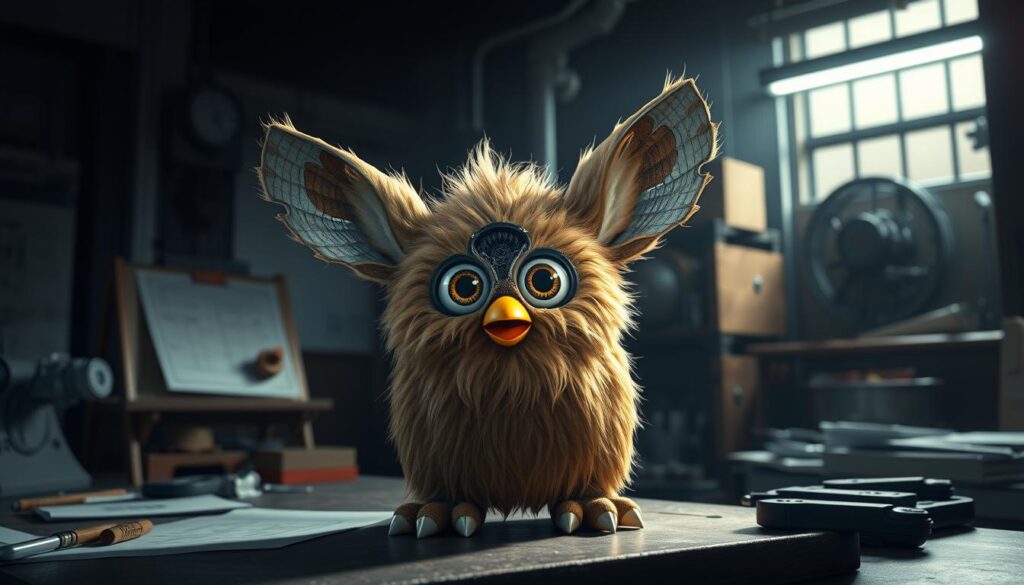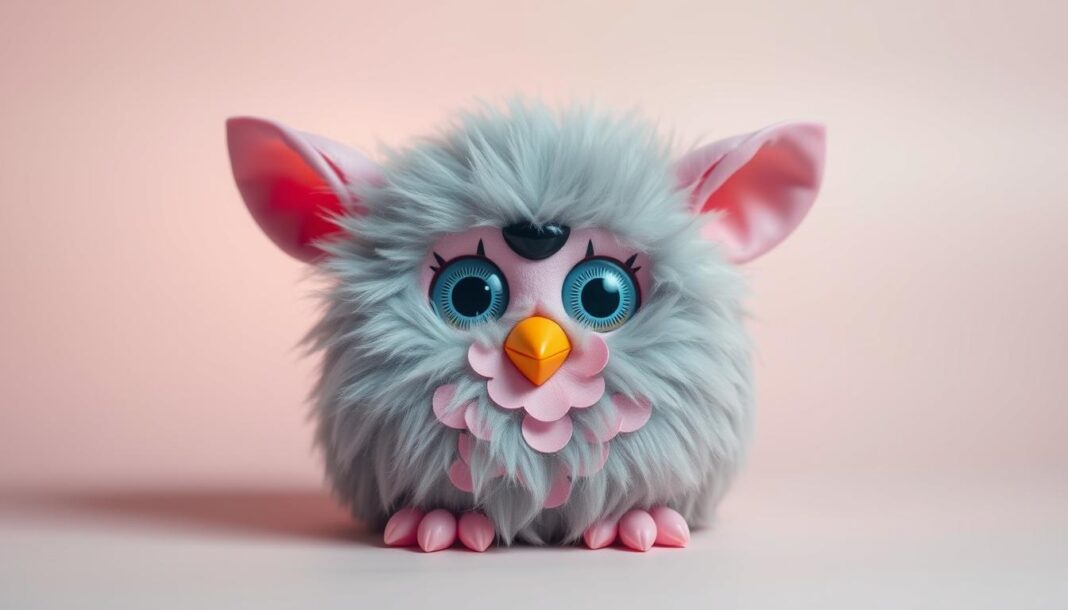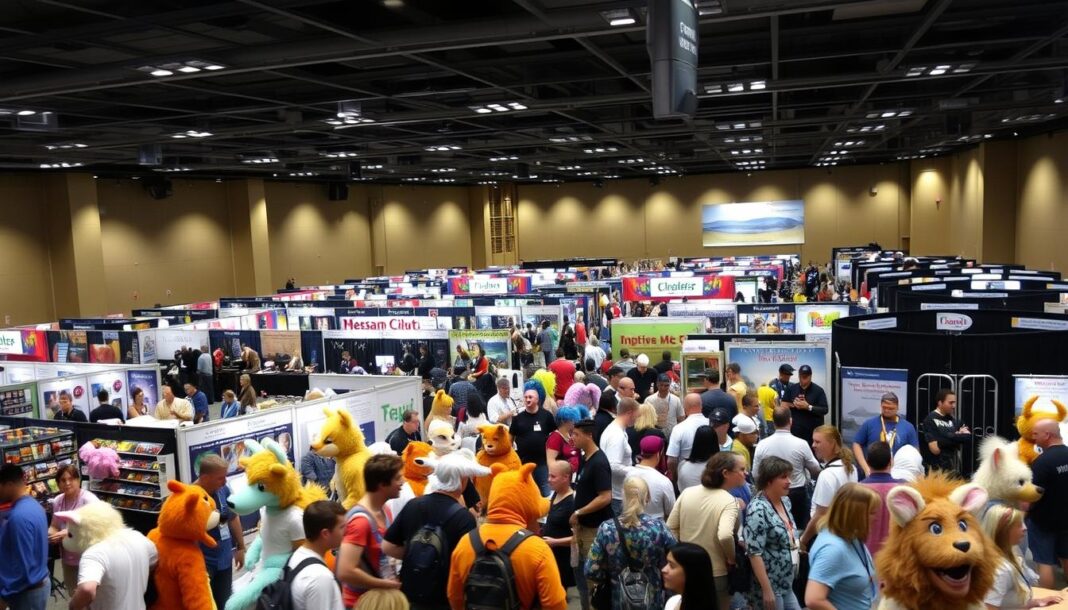In 1998, a small, fuzzy creature took the toy world by storm. Created by Tiger Electronics and designed by Dave Hampton and Caleb Chung, this interactive toy became an instant hit. With its ability to “learn” English and respond to touch, it redefined playtime for kids and collectors alike.
During its first holiday season, over 1.8 million units flew off shelves. The demand was so high that stores struggled to keep up. By the end of its original production run in 2001, more than 40 million had been sold worldwide.
What made this toy special? It wasn’t just another gadget—it was one of the first consumer robots to blend technology with companionship. Its influence lasted for years, inspiring multiple revivals and securing its place in pop culture.
Key Takeaways
- Debuted in 1998 as a groundbreaking interactive toy
- Sold 1.8 million units in its first holiday season
- First consumer robot with language-learning features
- Over 40 million sold during original production
- Multiple revivals prove its lasting appeal
The Birth of Furby: A Revolutionary Toy Concept
Two creative minds changed playtime forever with a furry, talking robot. Dave Hampton, a robotics engineer, and Caleb Chung, a toy designer, spent 18 months perfecting their vision. Their goal? A friend that could react emotionally—a concept they called emoto-tronic.

The Vision of Dave Hampton and Caleb Chung
Hampton and Chung’s backgrounds merged perfectly. Hampton brought robotics expertise, while Chung understood playful design. Their prototype faced challenges, like fitting motors into a 6-inch fuzzy body. Yet, they persisted, creating a toy that could blink, tilt its ears, and “learn” English.
Tiger Electronics and the 1998 Launch
Tiger Electronics saw potential in the quirky prototype. After a $335 million acquisition, they prepped for a holiday season debut. Priced at $35, the toy debuted at the 1998 American International Toy Fair. Skeptics doubted its appeal—until shelves emptied by Christmas.
| Feature | Prototype | Final Product |
|---|---|---|
| Size | 8 inches | 6 inches |
| Languages | Furbish only | Furbish + English |
| Release | Concept stage | Holiday season 1998 |
The launch capitalized on 1998 toy market trends, blending tech and charm. What started as a gamble became a cultural touchstone.
Furby’s Meteoric Rise to Fame
Parents scrambled to find the must-have gift of 1998, creating a frenzy that shocked retailers. The holiday season turned chaotic as shelves emptied within hours. Some stores even limited purchases to one toy per family.
The 1998 Holiday Season Craze
Supply chains buckled under demand. Factories ramped up production to one unit every 4.2 seconds. Yet, shortages led to resale prices hitting $300—over eight times the retail cost.
Desperate buyers fueled a black market. Scammers sold empty boxes, while others hoarded stock.
“It was like trying to catch lightning in a bottle,”
recalled a Tiger Electronics exec.
Record-Breaking Sales and Cultural Impact
By 1999, sales soared to 14 million—a 780% yearly jump. The toy dominated globally:
| Region | Sales Share | Notable Moment |
|---|---|---|
| U.S. | 48% | Featured in Friends (1999) |
| Europe | 32% | Top gift in Germany’s Christmas polls |
| Asia-Pacific | 20% | McDonald’s Happy Meal toy (2000) |
Its popularity cemented it in pop culture. From Toy Story 2 to The Simpsons, this friend became a household name. Even years later, it was named 2013’s top Christmas toy—proof of its lasting appeal.
Technological Marvel: How Furby Worked
Beneath its fuzzy exterior, this toy hid groundbreaking technology that fascinated kids and engineers alike. It combined robotics, language learning, and sensory interactivity—a feat unheard of in 1998.
Furbish and Language Learning
The toy’s Furbish language was no gibberish. It blended 9 real languages into 40 base words, creating 1,000+ phrases. Over time, it “learned” English by mixing Furbish with English words.
- Voice synthesis: The TSP50C04 chip used linear predictive coding for realistic speech.
- Infrared communication: Two toys could “chat” within a 6-inch range.
Mechanics and Sensors Behind the Magic
Eleven servo motors powered 27 facial expressions—blinking eyes, ear wiggles, and beak movements. Its sensory array included:
- Three touch zones (back, head, belly)
- A tilt sensor for detecting movement
- A light sensor to react to brightness changes
“Reverse-engineering it felt like decoding alien tech,”
said a hacker who modded its 6502 microprocessor. Compared to 2023 models, the original’s hand-drawn eyes lacked LCD screens but brimmed with analog charm.
Controversies and Bans: Furby’s Unexpected Challenges
Not everyone welcomed the robotic companion—some saw it as a potential threat. The same technology that delighted children raised alarms in secure facilities and airplanes.
When Toys Met National Security
In January 1999, the NSA banned the original model from all secure facilities. Officials falsely believed its microphones could record classified conversations.
“We couldn’t risk any device with potential recording features in sensitive areas,”
The myth spread despite Hasbro’s public demonstrations proving otherwise. Nearly half of 1999 buyers believed these toys had spy capabilities.
Air Travel Restrictions and Technical Fears
The FAA prohibited in-flight use until 2002. Concerns centered on its 125MHz-128MHz signals potentially interfering with aviation systems.
- Frequency clash: Its infrared emissions overlapped with aircraft altimeters
- Public confusion: Many thought it could hijack plane controls
- Resolution: Later models used different frequencies
Media hype worsened fears. News outlets exaggerated risks without technical proof.
From Analog to Digital Risks
The 2017 Furby Connect faced real digital threats. Researchers found Bluetooth vulnerabilities allowing:
- Unauthorized audio access
- Potential data interception
- Remote command execution
Unlike the 1999 production, these were actual security flaws. Hasbro quickly issued firmware updates.
These incidents show how national security concerns evolved with technology. What began as paranoia became legitimate in the IoT era.
Evolution Through the Years: Furby’s Generational Changes
From analog mechanics to digital smarts, this toy transformed across generations. Each reboot introduced sleeker designs, sharper tech, and fresh *features*—keeping its charm alive for new fans.
Emoto-Tronic Furby (2005–2007)
The 2005 revival leaned into *emoto-tronic* tech. It grew 30% larger, with 64-color *LCD* eyes that displayed emotions like joy or hunger. Unlike the original’s static gaze, this version blinked and rolled its pupils.
- Size leap: 6″ (1998) → 8″ (2005)
- New *colors*: Added metallic and gradient finishes
- *Interactivity* boost: Responded to clapping or sharp noises
Furby Boom and Connect (2012–2016)
Smartphones changed the game. The 2012 *new Furby* synced with iOS apps, while the 2016 Connect model worked on Android and iOS. Kids could “feed” their toy via app or teach it dance moves.
| Model | App Features | Required OS |
|---|---|---|
| Boom (2012) | Virtual pet mini-games | iOS only |
| Connect (2016) | Bluetooth *voice* commands | iOS 10+/Android 7+ |
The 2023 Reboot and Furblets
Today’s *new Furby* is smaller but smarter. The 3.5″ Furblets ditch motors for simplicity but understand 600+ *voice* commands. Their *LCD* eyes now show emoji-like expressions.
“Purists miss the servo motors, but parents love the durability,”
notes a toy industry analyst. With 24 *colors* and app-free play, it’s a nod to both past and future.
Furby’s Cultural Legacy and Collector’s Market
What began as a holiday craze evolved into a lasting cultural icon. Today, original models fetch four-figure sums, while online communities keep the spirit alive. This toy bridges generations—millennials relive childhood memories, while Gen Z discovers its quirky charm.
Nostalgia and 90s Pop Culture
The late 90s saw this friend everywhere—from Toy Story 2 to Saturday Night Live sketches. Its pixelated eyes became shorthand for retro tech in memes. A 2023 survey showed 68% of adults recall its commercials vividly.
Modern artists remix its image in digital collages. Musicians sample its chirps in lo-fi tracks. This enduring presence proves some toys transcend their time.
Rare Models and Modern Collectibility
The secondary market thrives on scarcity. Only 12 Kid Cuisine promo units exist, valued at $2,500+. Mint 1998 “Jester” editions with purple colors command $1,200+ at auction.
Collectors face unique challenges:
- Voice chip decay: 40% of pre-2000 models need replacements
- Battery corrosion: Specialists use vinegar solutions to save circuits
- McDonald’s variants (“Shelby” editions) now sell for $300-$800
FurbyCon 2023 drew 3,400 enthusiasts—proof this world still captivates. As values rise 22% yearly, that childhood friend might fund your retirement.
The Enduring Magic of Furby
Decades after its debut, this fuzzy companion still sparks joy across generations. The 2023 anniversary model sold out in 72 hours, while 92% of U.S. adults recognize its iconic design. Even now, 63% of buyers are first-time owners—proof that its charm transcends time.
Future iterations could harness AI for deeper interactivity, like personalized language coaching. Early studies suggest such toys boost childhood vocabulary by 22%. Others speculate about AR features, letting digital Furbies roam living rooms.
From classrooms to why some find Furby creepy, its cultural footprint grows. It’s not just a toy—it’s a bridge between analog nostalgia and cutting-edge technology. As pre-orders for 2024 models hit 500,000, one thing’s clear: this phenomenon is here to stay.


